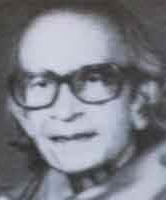 Vamiq Jaunpuri
Vamiq Jaunpuri
(Vāmiq Jaunpūrī)
1909 – 98
 Vamiq Jaunpuri
Vamiq JaunpuriVamiq Jaunpuri (also Wamiq Jaunpuri; 1909-98) was born Aḥmad Mutaba Zaidi (Aḥmad Mutabā Zaidī) in the village of Kajgaon, Jaunpur District, in what is today Uttar Pradesh. The family were land-owners (zamīndārs). He was educated in Barabanki and Faizabad, and earned a law degree from Lucknow University. He practiced law for a short time, but found it unsuitable to his temperament, so he abandoned it. He became a civil servant in 1933, and shortly thereafter met Sajjad Zaheer (1905-73) and embraced the tenets of the Progressive Movement.
His early poems lauded the freedom movement, protest, and rebellion for the sake of social justice. However, these works were written in secret for fear of losing his job. He published four volumes of poetry: Cīḵẖen (Shrieks; 1947), Jaras (Bell; 1950), Shab-i cirāgh (Night Light; 1978), and Safar-i nātamām (Incomplete Journey; 1990). “Bhūkā bangāl” (Hungry Bengal)* is his most famous poem and perhaps the best known and most quoted poem of the scores composed on the theme of the 1943 Bengal Famine. It is estimated that between two and three million people died of starvation and its attendant effects due to inept British colonial inaction and rampant profiteering and speculation. The poem was elaborately presented in the film Dhartī ke lāl (Children of the Earth; 1946), directed by Khwaja Ahmad Abbas (1914-87), based two short plays by Bijon Bhattacharya (1917-78), Nabānna (Ninety) and Jabānabandi (Statement), and the novella, Anndātā (Giver of Food), by Krishan Chander (1914-77). The film is available on YouTube (it starts at 1:29:34 to 1:33:42). The straightforward, rustic Khari Boli style in which the poem is written was matched by the haunting urgency in the elaborate, hortative choral setting which Ravi Shankar (1920-2012) composed for it as a major production number toward the end of the film. One can also view the brief film debut of the very young Zohra Sehgal (1912-2014).
Jaunpuri not only pursued poetry but was also keenly interested in gardening, calligraphy and painting. His most notable collections of poems are Jaras, Cheekhein, Shab Chiragh, and Safar Natamaam. For his literary work, Jaunpuri was awarded the Soviet Land Nehru Award, Uttar Pradesh Urdu Akademy Award and the Meer Award.

